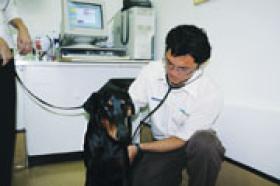
Printed in #89 May/Jun Dogs Life 2008.
Winter-warming recipesMany Dogs Life readers have asked for winter-warming recipes for their dogs, however, the delicious homemade treat you get off the Internet or from a friend may not be beneficial for your hungry pooch. Dogs Life Editor Caroline Zambrano finds out why.
Why must dog owners be careful about feeding their pet a winter-warming, home-cooked recipe? Home-cooked diets are best formulated specifically for the individual animal to consider species, breed-related problems, individual diseases, caloric requirement and animal/owner preferred ingredients, says Scott Campbell, specialist veterinary nutritionist. The one recipe fits all approach is not precise and results in diets that are sub-optimal for many individuals.
As a general rule, Campbell says treats should supply less than 10 per cent of the total daily calories ingested to prevent them unbalancing the daily diet, to minimise undesired weight gain and to reduce the risk of your pet developing finicky eating habits. “The dangers of feeding your pet various human foods extend beyond the risk of expanding its waistline, says Campbell, who is an adjunct academic at the University of Queensland. A number of studies have reported the toxic potential of many common ingredients when fed to dogs and/or cats.
Dangerous ingredients
Campbell says there are some ingredients to watch out for when considering winter-warming, home-cooked foods and treats for your pooch.
* Grapes and raisins: Ingestion can cause kidney failure in dogs and cats.
* Macadamia nut: Ingestion has been associated with weakness and tremors in dogs.
* Chocolate, tea, cola or cocoa beans: These contain theobromine, which dogs and cats do not metabolise efficiently, causing gastrointestinal upset, cardiac arrhythmias and seizures.
* Garlic or onion: Ingestion may develop anemia secondary to oxidative damage to the red blood cells and altered platelet function.
* Xylitol or propylene glycol: Food products containing these should be avoided as they may have detrimental effects in pets – dogs can develop a fairly sudden drop in blood sugar, resulting in depression, loss of coordination and seizures.
Other potentially dangerous ingredients for dogs and cats include caffeine, salt, nicotine and uncooked yeast dough, Campbell adds. Raw, undercooked or improperly stored meats can be a source of microbial infection. And raw egg white contains avidin, which can result in a biotin deficiency if fed regularly, so proper preparation of foods is important to consider, he says.
Access to items such as bones, candy wrappers, aluminum foil or plastic wrap can also be a problem for dogs and cats, as they may become lodged in the mouth, oesophagus, stomach or intestine if eaten. To discuss winter-warming diets for your dog, Campbell advises a chat with your vet for advice.
You can also check out the #83 Dogs Life May/June 2007 edition for information on winter foods and supplements. For back issues phone 1300 303 414.
You need to look after your pooch's health - check out our all-new DOGSLife Directory



